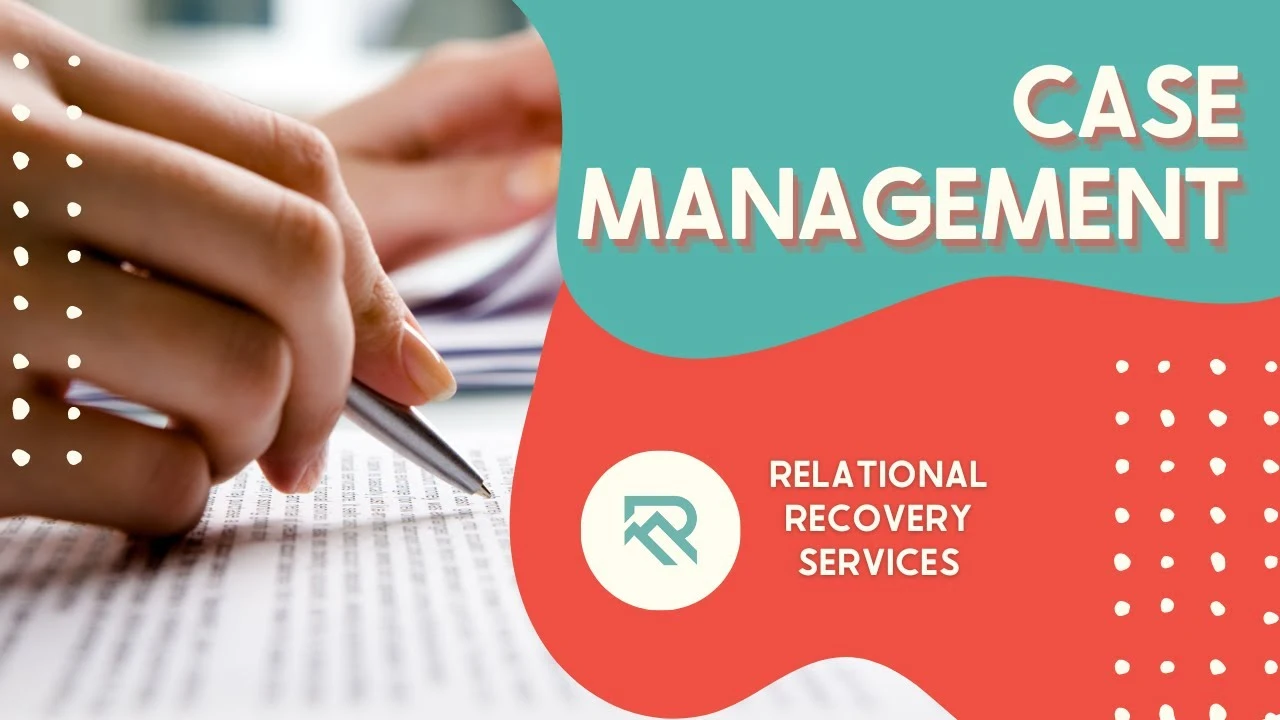Case Management
Case managers are responsible for facilitating each transition throughout the addiction treatment process, and even into recovery. Clients can feel comfortable receiving help with the safety net provided by our skilled case management team.


Case Management
Case management, also known as client advocacy or care coordination, addresses clients with multiple issues and seeks integrated treatment choices beyond detox and rehabilitation. Although case management has roots in social work, the service does not rely on social work licensure but instead incorporates working across multiple disciplines to assist clients in maintaining a healthy lifestyle.
Our Case Managers at Relational Recovery work directly with individuals in addiction treatment or recovery. Also involved are family members and friends of the client. In addition to working with service providers, our case managers may also coordinate care for a client while communicating in professional, ethical ways that include cultural sensitivity and trauma-informed best practices.

Why is Case Management Important?
According to the Substance Abuse and Mental Health Services Administration (SAMHSA), case managers are particularly beneficial in substance abuse settings. These professionals can assist patients establish a care plan that incorporates both mental health and medical procedures, as these issues are usually complicated and long-term treatment is often required.
In addition to arranging for care at an inpatient or outpatient center based on a client’s individual needs, case managers may also assist patients with getting prescription drugs and undergoing medical tests. As the hub for treatment, case managers are responsible for coordinating care across the mental and behavioral health sectors.
Case managers do not discard clients once treatment is over. For many individuals, returning to the real-world can be extremely intimidating, therefore it is important to have the continued assistance of case managers in this phase as well. Our skilled team assists clients with nutritional plans, employment and housing assistance, 12-step support group searches, and even ongoing individual or family therapy if needed.

What do Case Managers do?
It is the responsibility of our case managers to function as referral sources and service coordinators, as well as an advocate for clients. They must be familiar with the design of the healthcare sector and the behavioral and mental health sector to effectively assist the client. They can also build a treatment plan including a variety of approaches. These include, but are not limited to:
- Detox, including medically-assisted programs
- Residential inpatient care
- Hospitalization
- Long-term or intense outpatient treatment
- Traditional outpatient services
- Life coaching
- Employment assistance
- Mental health
- Family counseling
- Housing
- Aftercare and follow-up
- Sober escort service
Case managers work for the client and assist them in rebuilding their lives during treatment and once treatment has been completed. In addition, case managers are not restricted to a specific area in a client’s life. Their services extend to physical health, mental health, living situations, interpersonal conflict, and so much more.
Download Our FREE Integrative Support eBook
Benefits of Case Management
- Improve Treatment Retention- Clients with case managers are more likely to stay in recovery and have a lower recidivism rate.
- Foster Independence – Many of our clients must learn how to take care of themselves again. Taking care of oneself is compromised by active addiction. Our case managers assist our clients in developing life skills such as setting and achieving personal goals, practicing self-care, grocery shopping, preparing healthy meals, maintaining a clean living space, managing one’s finances, using one’s time wisely, maintaining gainful employment, and building healthy relationships with other men and women in recovery.
- Provide Resources – Case managers can assist the individual in using all of the resources available to combat his or her illness.
- Employment Assistance – Finding a suitable recovery-focused job is critical to financial independence, debt reduction, and personal improvement. A case manager helps a client locate a job that matches their recovery goals, including being punctual, finishing personal tasks throughout the day, handling workplace conflicts in a healthy and productive way, and keeping a daily schedule.
- Improve Follow-Through – Case managers ensure clients receive and follow through on all of their issues, including the physical and mental aspects of their addiction.
- Development of Healthy Communication Skills – The ability to communicate effectively and express one’s personal needs is a key component of a healthy relationship. Personal boundaries must be maintained in order to maintain a healthy relationship.
- Relapse prevention – Working with clients, case managers identify personal relapse triggers and handle the uncomfortable feelings and emotions that might ultimately lead to a client’s relapse.
- Operate on an As-Needed Basis – When an individual is in recovery from addiction, the case manager does not expect them to remain dependent on them for the rest of their lives. Case managers, in general, take an as-needed approach to support individuals during treatment. Initially, a case manager may have to call or visit their client multiple times daily in order to keep them accountable as the client moves towards recovery. As the client becomes more proficient at using the tools and skills necessary to live a sober lifestyle, the case manager can gradually reduce monitoring sessions and visits. The client will receive support only when they really need it, with the ultimate goal of eventually not needing it at all.

Trust Relational Recovery Services
Everything from your mental and physical health, finances, career, and legal status is affected by substance abuse and addiction. At Relational Recovery Services, our case management professionals have the training, flexibility, and knowledge required to help individuals put their lives back together.
We recognize and understand the significant role case management plays in our clients’ successful recovery. Our team at Relational Recovery Services will connect you to a qualified case manager who will help you navigate the complexities of life in the real world once you are ready. Call us today.
Snippet: Whether a client has yet to begin addiction treatment, is currently in a rehabilitation program, or has achieved recovery, case managers work behind the scenes to make it all happen. By applying their real-world experience and expertise, our case managers work with each client to ensure that the transition into the next phase—whatever that may be—goes smoothly.

